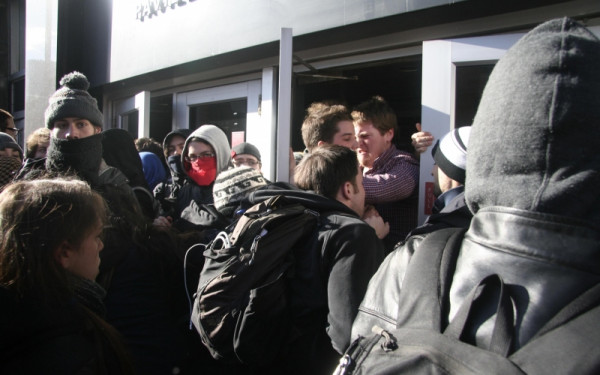Waiting in Limbo
Like 45,000 others, the 26 Concordia students charged by the university for their actions during the strikes head back to class Wednesday. They just have no idea for how long.
Despite being charged months ago, all 26 have yet to hear from the university regarding their trial.
They do not know which actions specifically they are being charged for—meaning they have no idea what their chances are of being found not guilty, nor whether they committed the infractions they stand accused of.
They have no evidence and no date. There is no word on who will make up the tribunal that will judge them and precious little support from their union.
It’s no wonder, then, that they’re feeling a little overwhelmed.
“It’s starting to snowball,” said charged student and former Geography Undergraduate Student Society VP Finance Trevor Smith.
Since early June, he’s been working with the others charged to make a game plan. A task, he says, that has not been easy, given the circumstances.
Walking Blind
For those charged, the most frustrating aspect of the process has been the lack of communication. Since they were informed of the charges, they’ve heard nothing. And while that is perfectly within the Code of Rights and Responsibilities, it’s difficult to enjoy a summer knowing a second envelope is coming.
With the start of the school year upon them, they’re in an odd position. Should they be found guilty, possible sanctions range from small fines up to expulsion. While it’s unlikely that the students will be expelled for their actions, starting a new year with that possibility hanging over their degree is difficult at best.
“There is definitely a dark cloud hanging over my head,” said Smith.
So the students are doing their best to plan. They’ve been working primarily with the Concordia Student Union’s Student Advocacy Centre, trying their best to accommodate for all possible cases. Of course, most of their actions will hinge on the kind of evidence being presented against them.
“A lot of us were not familiar with the legal aspects of things,” said Smith, noting however, that as a group they did have one advantage. “There’s a diverse type of people who have been charged; there are a lot of people in different departments. We’re drawing on our critical analytics skills and finding ways to move forward.”
No Union to Speak Of
There’s little coming from the student union, something President Schubert Laforest said is no mistake.
“At the beginning I felt the urge to go to the university and ask them to drop the charges,” said Laforest. “But that’s not my place. I need [the charged students’] consent first.”
The CSU’s official stance—or lack thereof—has raised some questions. Neither students nor the university administration know whether the executive plans to fight the charges. Without a definite press release, there are only a few conflicting interviews to go on.
After the initial charges were laid, CSU VP Advocacy Lucia Gallardo told The Link that she planned to “go full out on social media” to get in touch with the charged students and work out a collective plan. She asked students to come to her office, and said she would certainly be involved in the group’s defense.
But tactics have either changed drastically since then, or the left hand doesn’t know what the right is doing. Laforest said that the students will be relying on the “trained advocates” from the Advocacy Centre, rather than on Gallardo. The CSU executive, he said, is more interested in consulting with the students and then deciding on a message to send the administration.
Like the students, Laforest said he’s just trying to plan for every possible outcome. When asked about the CSU’s response should the students be found guilty, however, Laforest paused. While calling the charges “an injustice,” he said he still was unsure if the CSU would attempt to appeal any guilty verdicts.
At the end of the day, Laforest thinks his message is very clear. “It’s obvious that we really want these [charges] to go away,” he said. “It’s counter-productive to be charging the students.”
Making an Example
One way or another, the students are definitely going to fight the charges. Smith, for one, feels it’s about more than the students themselves. The school is making an example with these charges, and will inevitably be setting a precedent.
“A lot of us that have been charged have at some point held a political position. It’s discrimination. That’s why we feel that we really need to defend ourselves,” he said, adding,
“In terms of our attitude, we’re trying everything we can to make this big in the next semester.”
Some of the students are faced with what Smith refers to as “the easy way out.” The charges may be absolved, or at least a hearing avoided, if the students apologize for their actions. For those personally invested in the strike, however, this isn’t much of an option. An apology, Smith says, would “cheapen” the collective strike action
“If we’re going to make this community and this university a better place, then we need to stand up and say, ‘No, you can’t operate like this,’” Smith said.
“We have to operate with ethical principles, with a basic understanding of trust and empathy. It seems like universities in general are moving away from that.”

_1_864_576_90.jpg)


_600_375_s_c1.png)
_600_375_90_s_c1.jpg)

_3_600_375_90_s_c1.jpg)